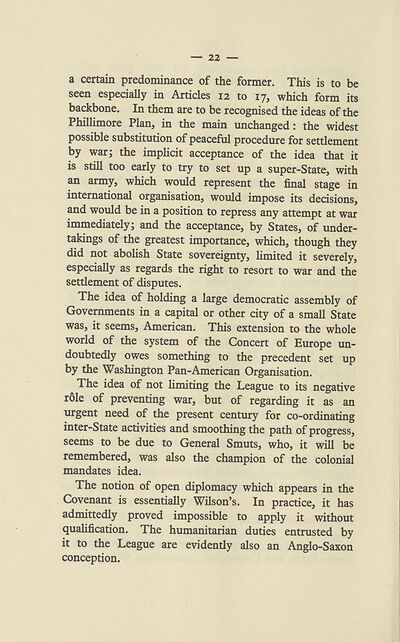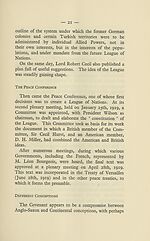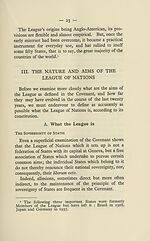Download files
Complete book:
Individual page:
Thumbnail gallery: Grid view | List view

— 22 —
a certain predominance of the former. This is to be
seen especially in Articles 12 to 17, which form its
backbone. In them are to be recognised the ideas of the
Phillimore Plan, in the main unchanged: the widest
possible substitution of peaceful procedure for settlement
by war; the implicit acceptance of the idea that it
is still too early to try to set up a super-State, with
an army, which would represent the final stage in
international organisation, would impose its decisions,
and would be in a position to repress any attempt at war
immediately; and the acceptance, by States, of under¬
takings of the greatest importance, which, though they
did not abolish State sovereignty, limited it severely,
especially as regards the right to resort to war and the
settlement of disputes.
The idea of holding a large democratic assembly of
Governments in a capital or other city of a small State
was, it seems, American. This extension to the whole
world of the system of the Concert of Europe un¬
doubtedly owes something to the precedent set up
by the Washington Pan-American Organisation.
The idea of not limiting the League to its negative
role of preventing war, but of regarding it as an
urgent need of the present century for co-ordinating
inter-State activities and smoothing the path of progress,
seems to be due to General Smuts, who, it will be
remembered, was also the champion of the colonial
mandates idea.
The notion of open diplomacy which appears in the
Covenant is essentially Wilson’s. In practice, it has
admittedly proved impossible to apply it without
qualification. The humanitarian duties entrusted by
it to the League are evidently also an Anglo-Saxon
conception.
a certain predominance of the former. This is to be
seen especially in Articles 12 to 17, which form its
backbone. In them are to be recognised the ideas of the
Phillimore Plan, in the main unchanged: the widest
possible substitution of peaceful procedure for settlement
by war; the implicit acceptance of the idea that it
is still too early to try to set up a super-State, with
an army, which would represent the final stage in
international organisation, would impose its decisions,
and would be in a position to repress any attempt at war
immediately; and the acceptance, by States, of under¬
takings of the greatest importance, which, though they
did not abolish State sovereignty, limited it severely,
especially as regards the right to resort to war and the
settlement of disputes.
The idea of holding a large democratic assembly of
Governments in a capital or other city of a small State
was, it seems, American. This extension to the whole
world of the system of the Concert of Europe un¬
doubtedly owes something to the precedent set up
by the Washington Pan-American Organisation.
The idea of not limiting the League to its negative
role of preventing war, but of regarding it as an
urgent need of the present century for co-ordinating
inter-State activities and smoothing the path of progress,
seems to be due to General Smuts, who, it will be
remembered, was also the champion of the colonial
mandates idea.
The notion of open diplomacy which appears in the
Covenant is essentially Wilson’s. In practice, it has
admittedly proved impossible to apply it without
qualification. The humanitarian duties entrusted by
it to the League are evidently also an Anglo-Saxon
conception.
Set display mode to:
![]() Universal Viewer |
Universal Viewer | ![]() Mirador |
Large image | Transcription
Mirador |
Large image | Transcription
Images and transcriptions on this page, including medium image downloads, may be used under the Creative Commons Attribution 4.0 International Licence unless otherwise stated. ![]()
| League of Nations > Background to the League > Aims, methods and activity of the League of Nations > (24) |
|---|
| Permanent URL | https://digital.nls.uk/202447579 |
|---|
| Shelfmark | LN.1(23) |
|---|---|
| Attribution and copyright: |
|
| Description | Over 1,200 documents from the non-political organs of the League of Nations that dealt with health, disarmament, economic and financial matters for the duration of the League (1919-1945). Also online are statistical bulletins, essential facts, and an overview of the League by the first Secretary General, Sir Eric Drummond. These items are part of the Official Publications collection at the National Library of Scotland. |
|---|---|
| Additional NLS resources: |
|

